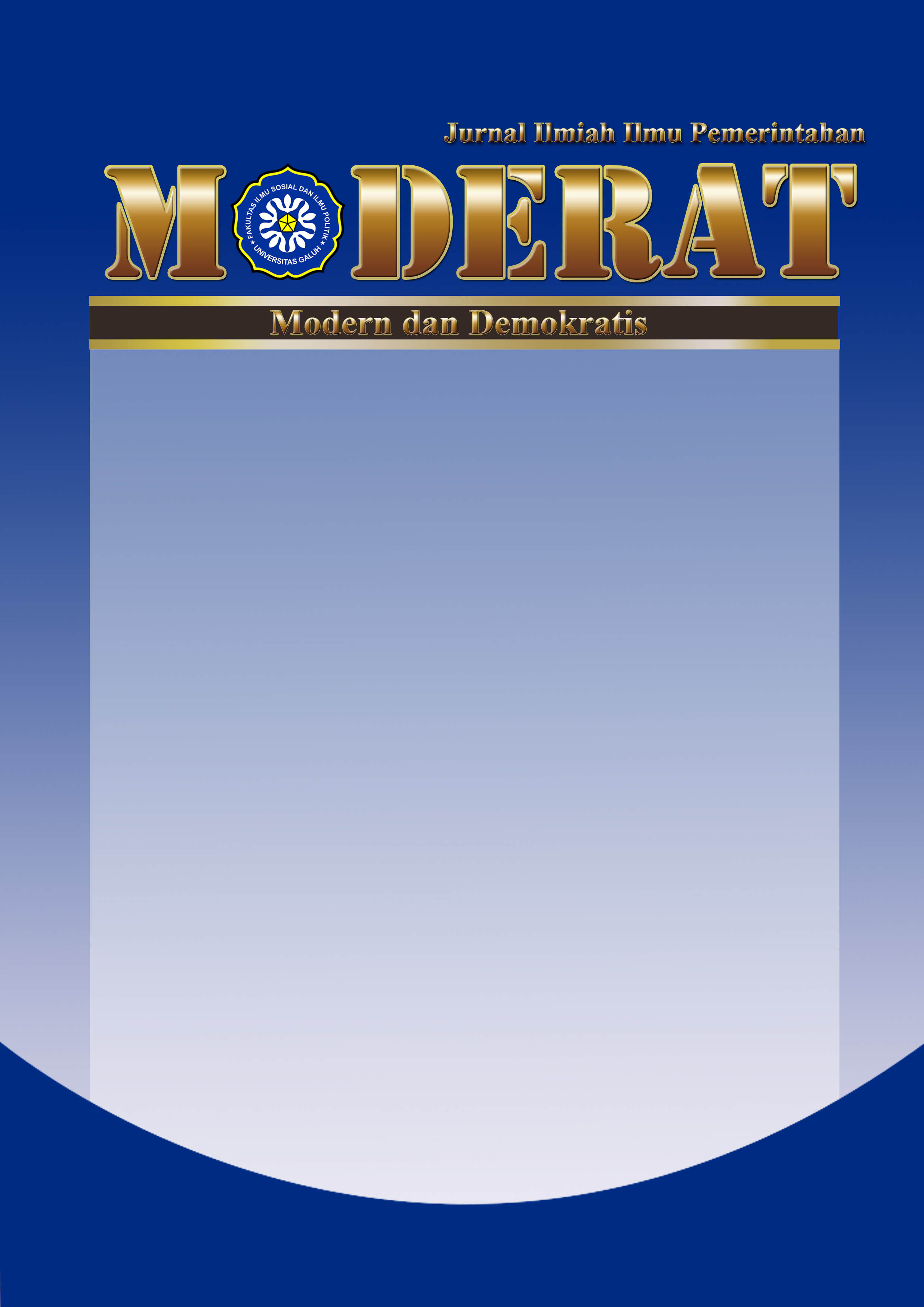GOVERNMENTALITY DALAM PENGELOLAAN PARIWISATA BERKELANJUTAN DI KABUPATEN GIANYAR BALI
DOI:
https://doi.org/10.25157/moderat.v11i2.4979Abstrak
Pengelolaan pariwisata berkelanjutan telah menjadi isu krusial di Bali, salah satu tujuan wisata terkenal di Indonesia. Pesatnya pertumbuhan pariwisata telah menimbulkan dampak negatif terhadap lingkungan dan budaya lokal. Oleh karena itu, penerapan pemerintahan yang berlandaskan etika lingkungan dan inklusi sosial menjadi strategi penting dalam pengelolaan pariwisata berkelanjutan sekaligus melestarikan identitas budaya Bali. Penelitian ini mengkaji implementasi governmentality dalam pengelolaan pariwisata berkelanjutan di Bali. Melalui partisipasi masyarakat dan konsultasi publik, pemerintah Bali mengintegrasikan masukan dari masyarakat lokal, akademisi, dan pemangku kepentingan industri pariwisata dalam pengambilan keputusan terkait pariwisata. Etika lingkungan hidup menjadi fokus utama dalam pengelolaan pariwisata, dengan peraturan yang ketat untuk melindungi sumber daya alam dan lingkungan. Hasil implementasi pemerintah Governmentality menunjukkan dampak positif. Pariwisata Bali menjadi lebih berkelanjutan dengan pemantauan lingkungan yang ketat dan penegakan peraturan. Hal ini meningkatkan keterlibatan masyarakat lokal dalam industri pariwisata, memastikan manfaat pariwisata didistribusikan ke seluruh lapisan masyarakat. Pelestarian budaya juga menjadi perhatian utama dalam kebijakan pariwisata melalui keterlibatan masyarakat lokal dalam pengambilan keputusan. Studi ini memberikan kontribusi yang signifikan untuk memahami implementasi governmentality dalam pengelolaan pariwisata berkelanjutan di Bali. Dimaksudkan bagi pemerintah dan pemangku kepentingan pariwisata untuk mencapai keseimbangan yang tepat antara pertumbuhan pariwisata berkelanjutan, pelestarian budaya, dan perlindungan lingkungan di masa depan.
Referensi
Esmark, A. (2018). Limits to liberal government: An alternative history of governmentality. Administration & Society.
Foucault, M. (2007). Security, Territory, Population: Lectures at the College de France 1977-1978 (M. Senellart, Ed.). New York: Palgrave Macmillan.
Foucault, M., I. G. B., & C. Gordon, & P. Miller (Eds.). (1991). Governmentality The Foucault Effect: Studies in Governmentality. The University of Chicago Press.
Hani Oktavia Trianahadi. (2020). Governmentality dalam Program Jalin Matra: Studi Kebijakan Pengentasan Kemiskinan Pemerintahan Soekarwo Periode 2014-2019 Jawa Timur.
Hanif, A., Fitriyah, H., & Febriansah, R. E. (2020). PERAN ENVIRONMENTAL PERFORMANCE TERHADAP KINERJA PERUSAHAAN DENGAN CORPORATE SOCIAL RESPONSIBILITY SEBAGAI VARIABEL MEDIASI. JIAFE (Jurnal Ilmiah Akuntansi Fakultas Ekonomi), 6(2), Inpress. https://doi.org/10.34204/jiafe.v6i2.2264
I Putu Rai Sukmaning Wahyu, I. K. P. E. (2019). Praktik Governmentality dan Nativisme dalam Kebijakan Keluarga Berencana Krama Bali.
Nurhhidayatullah, D. (2023). Perubahan Iklim Sebagai Governmentality: Rezim Praktik Untuk Adaptasi Di Pekalongan. 8(2).
Pringle, R. (2014). A Short History of Bali, Indonesia’s Hindu Realm. Crows Nest: Allen & Unwin.
Sugiyono. (2007). Metode Penelitian
Kuantitatif Kualitatif dan R&D. Bandung : Alfabeta.
Sugiyono. (2012). Metode Penelitian Kuantitatif Kualitatif dan R&D. Bandung : Penerbit Alfabeta.
Umar Husein. (2007). Metode Penelitian Untuk Skripsi Dan Tesis Bisnis. Jakarta : PT. Raja Grafindo Persada.
Zubaebi. (2016). Pengembangan Masyarakat, Wacana dan Praktek. Jakarta : Prenada Media Group.
Unduhan
Diterbitkan
Cara Mengutip
Terbitan
Bagian
Lisensi
Hak Cipta (c) 2025 Moderat : Jurnal Ilmiah Ilmu Pemerintahan

Artikel ini berlisensi Creative Commons Attribution 4.0 International License.
Moderat : Jurnal Ilmiah Ilmu Pemerintahan © 2023 by Program Studi Ilmu Pemerintahan is licensed under CC BY-SA 4.0




















